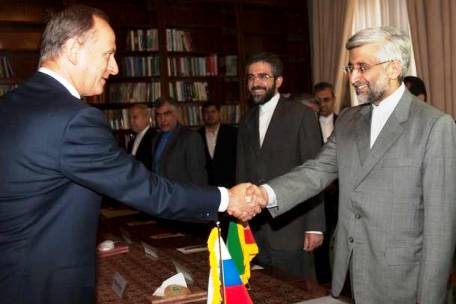Russia, Iran’s Executive Agent against the West

By: Mohammad-Hossein Malek
Employing any scales or indices, one may come to the conclusion that the strategic balance in the Middle East region has been disturbed against the interests of Israel and the US, considering the upheavals in Tunisia and Egypt. A balance that provided the US and the West’s interests and allowed for policies against Arabs and Muslims after the dissolution of the Ottoman government in the First World War, and the formation of an Israeli government from 1947 onwards. In this current situation, Russia, China and Iran-- according to their international status-- will gain strategic interests.
Due to its political desires, its historical hegemony-seeking nature and its humiliating defeat in the Cold War by the West, Russia will not ignore this opportunity. The Libyan experience showed the country that it could not obtain an appropriate share, as it expected, in the world’s management in collaboration with the West. More importantly, Moscow sees no chance for extensive involvement for itself in what is being prepared in Syria. As a result, contrary to its desire, it needs to defend Syria and attempt to employ diplomacy for increasing its share of influence in the region. There have been many attempts to adjust Obama-era relations between the West and Russia, using a “reset” policy, while new planning in the country to return Putin to the executive scene has been proved useless in the confrontation between Russia and the West.
The other winner of the mentioned upheavals is China (contrary to North Korea and Japan) which mentions the US as its greatest rival in the Middle East and Eastern Asia, while it has been benefitting from the weakening status of the US in the political arena, even though it is not specifically trying to do this. It needs an economically strong US and the West to improve its own economic growth, while in the political arena, the US has been defeated in Iraq and Afghanistan, is criticized by Muslim countries for its ineffective challenging policies in the Middle East and has no contribution to make to Beijing’s leaders. Adopting a peaceful expansion policy, the country has halted any pretext by the Western countries to reduce its influence. Total consistency with the West during the adoption of Security Council resolutions enabled China to find a way to comply with the excessive unilateral policies of the U.S.
Chinese analysts review the status quo of the Middle East as follows:
1- The people of this region desire to improve their economic situation.
2- Countries dependant on the US in their foreign policy will act freer in the international arena, something that is supported by China.
3- The US is in need of organizing its domestic affairs, among which employment is of high importance.
4- If Washington makes no changes in its domestic affairs, there will be great alterations in the world’s view of the leadership of this country.
5- The White House will attempt to tackle the economic problems it is facing through cooperation with the Asian and Pacific countries.
These viewpoints can be interpreted as the happiness of China about these changes and also as the attempts of the country to gain more of the US share in international management, as China’s relations with the US have recently been win-win.
In such a strategically unbalanced situation for Israel, Iran can be a winner in the short run at least, while to achieve political desirability, it needs a breaking of the boycott of the Central Bank and the non-purchase of its oil relatively. The support of the UK and consequently the US for the boycotts caused, however secret, the presence of the EU, something that makes the situation more complicated, as one of the main objectives of these boycotts, other than a halt to nuclear activities, has been the removal or deduction of Iran’s presence in the regional arena.
Iran, relying on its religious commonalities and revolutionary anti-imperialism and anti-Israeli positions, has had great impact on the Middle East from the revolution onward. It is natural that in this area, an influence sphere be defined and expanded. But Iran suffers from planning problems to tackle these issues, while in practice, it is playing a zero-sum game with Israel and the US. With such problems, Iran has not found a way to be an active player, rather it is an observer.
The main questions are whether these three countries-- considered as the winners of the upheavals-- can have joint cooperation; whether a certain strategy guaranteeing the interests of all three can be defined in the game with the losers, i.e. the US and Israel, and whether a distinguishable outcome can be reserved in the adoption of individual policies. Answering these questions is not easy, while any of these countries may also have doubts about the desires of the others in the game.
Iran should resist and attempt to mitigate boycotts against it through resorting to the opportunities available to China, which can be its executive leverage. Japan and India can be also effective in reducing the sanctions, although not as much as China. It should be noted that China will not accompany Europe and the US in following their policies on the non-purchasing of Iranian oil; the same behavior is seen against what is expected by the Iranian oil authorities in international arena. It is also noteworthy that the US sanctions cannot last forever and that country and the West will abandon the boycotts for their own economic and political situations.
At first glance, it seems that Russia has the highest motivation to confront the issue in an organized manner, while what is needed is for Moscow to use all of its negotiation capacities in confrontation with the West in order to follow certain objectives. Finally, a consistent policy needs multi-layered diplomacy, while now no considerable changes are seen in any of these three countries.

